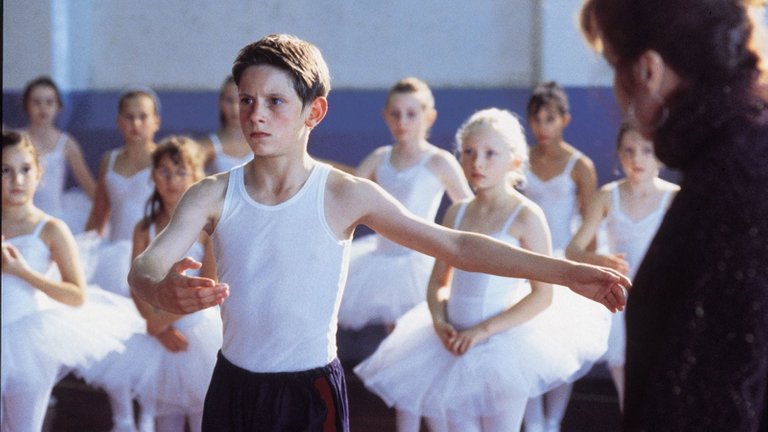Film Review: Billy Elliot (2000)

Many right-wing commentators today complain about Hollywood or Western films generals being “woke” and do it in a way that suggests this is new phenomenon that appeared suddenly and probably because of result of someone’s well-planned agenda. In reality, films were always “woke”, with only difference being than in earlier times, especially when those times were relatively good and public attention being drawn to other matters, “wokeness” didn’t appear to be such big deal. An example can be found in Billy Eliott, 2000 British musical drama directed by Stephen Daldrey.
The plot is set in Northern England in mid 1980s, during the great strike in which coal miners tried to stop government of Margaret Thatcher of closing pits and thus deprived them of their livelihood. One of the people affected is Jackie Eliott (played by Gary Lewis), widowed miner who, like his older son Tony (played by Jamie Draven), takes part in the strike. Jackie, trying to maintain the family tradition, sends his 11-year old son Billy (played by Jamie Bell) into local gym to train boxing. However, Billy dislikes the sports and instead find fondness for dancing, partially inherited by his now senile grandmother (played by Jean Heywood) who used to be aspiring dancer in her youth. So, he decides to join ballet class run by Mrs. Sandra Wilkinson (played by Julie Walters) and she discovers that he is a true talent. He, however, must take those classes in secret because Jackie and Tony, due to their own macho beliefs, can’t imagine that Billy would engage in ballet, effete activity unworthy of a true man. Things can further complicated when Billy learnes that his best friend Michael Caffrey (played by Stuart Wells) considers him more than just a friend.
At first glance, Billy Eliott looks very much like Brassed Off and The Full Monty, two British films that, through the medium of comedy, showed devastating effects of Thatcher era deindustrialisation on the British working class and suggested that the way it can restore its dignity and self-worth through art or show business. Most commentators, however, saw Billy Eliott through the lens of its handling of sexuality, namely those forms that would soon become known under acronym of LGBT. Relatively simple plot advocates acceptance through relatively simple and predictable plot, with Billy’s macho father, played wonderfully by Scottish actor Gary Lewis, gradually learning the lessons of acceptance and ends being proud of his son. The main problem for the film and source of some controversies was that it deals with sexual issues among pre-pubescent characters. Daldrey and his scriptwriter Lee Hall muddle the issue by having protagonist first rejecting romantic advances of his friends only to also reject advances of pre-pubescent girl, leaving the question of Billy Eliott’s sexual orientation open.
Billy Eliott was, despite everything, hailed by critics and became major international hit, thus marking the new important milestone in promoting modern-day notions of diversity within British and world cinema. But the real message behind the film was more narrowly political. Unlike Brassed Off and The Fully Monty, it was made under the Labour government and was clear product of “cool Britannia”, concept heavily promoted by British artists, film makers and intellectual thrilled with the idea of enlightened, progressive and prosperous Britain becoming new shining city on the hill and beacon of hope for the world under the wise leadership of Tony Blair. This concept, underlined with film’s epilogue during which adult Billy Eliott performs in 1998 London, goes hand in hand with film’s implicit but unmistakable message. Striking miners have actually deserved to lose their fight with Thatcher because they were still clinging to old-fashioned 20th Century macho and collectivistic values of traditional working class instead of ideas embodied by Blair and his Third Way, like those that the capitalism could be kinder and gentler only with a little bit more diversity and tolerance. In essence, it is the very same “wokeness” that dominates today’s government offices and corporate boards, so Billy Eliott, instead of vanishing industrial world of 20th Century projects the post-industrial world of today’s West.
RATING: 5/10 (++)
Blog in Croatian https://draxblog.com
Blog in English https://draxreview.wordpress.com/
Leofinance blog https://leofinance.io/@drax.leo
Unstoppable Domains: https://unstoppabledomains.com/?ref=3fc23fc42c1b417
Hiveonboard: https://hiveonboard.com?ref=drax y
Bitcoin Lightning HIVE donations: https://v4v.app/v1/lnurlp/qrcode/drax
Rising Star game: https://www.risingstargame.com?referrer=drax
1Inch: https://1inch.exchange/#/r/0x83823d8CCB74F828148258BB4457642124b1328e
BTC donations: 1EWxiMiP6iiG9rger3NuUSd6HByaxQWafG
ETH donations: 0xB305F144323b99e6f8b1d66f5D7DE78B498C32A7

I loved that movie and I remember that once in the public library I found a book with a similar story where the main character's name was Oliver but I don't remember his last name.